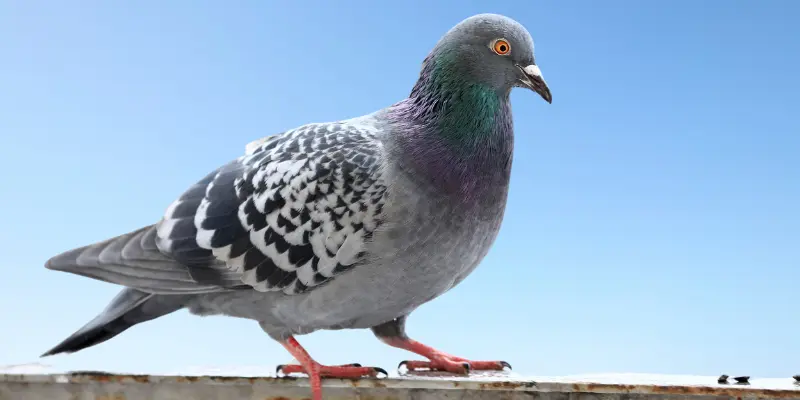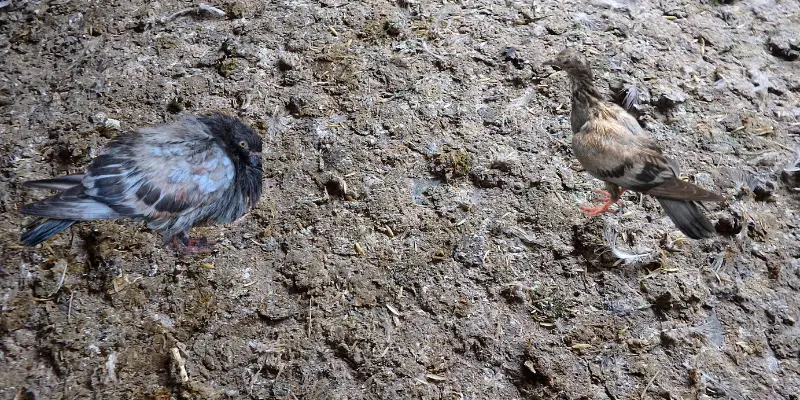Can You Have A Pet Pigeon – Care, Training And Health Tips
Published: 05 May 2025
Can you keep a pet pigeon at home? This is a common question for bird lovers and potential pigeon owners. Pigeons are more than just city birds; they’re intelligent, quiet, and affectionate pets that can recognize their owners and live comfortably in homes.
Table of Contents
Basic Facts About Pigeons
Pigeons are gentle birds that have lived close to people for thousands of years. They come in many colours like grey, white, and brown. Some pigeons can fly long distances, while others are bred just to live as pets.

Pigeons can remember faces, find their way home from far away, and even show love to their owners. These birds usually live for 10 to 15 years when they are cared for properly. They don’t need a lot of space, and they are quiet animals, which makes them easy to keep at home.
Pigeon Intelligence and Behaviour
Pigeons are highly intelligent. They can recognize faces, follow routines, and even be trained to return home after flying. Many pigeons form strong bonds with their owners and stay loyal to one mate for life. When treated with kindness, they become affectionate and social.
Popular Pigeon Breeds for Pets
There are many types of pigeons, but some are better for keeping as pets. The Fantail pigeon has a big, fan-shaped tail and looks very fancy. The Homing pigeon is known for flying long distances and finding its way home. The Lahore pigeon is calm and has beautiful colours, making it great for families.
The Jacobin pigeon has feathers around its head that look like a soft collar. These breeds are friendly, easy to care for, and enjoy being around people. Choosing the right breed helps make your experience with a pet pigeon much better.
What Does A Pigeon Need Each Day?
Pigeons have simple needs, but it’s important to meet them every day. First, they need fresh food and clean water. A balanced diet of seeds, grains, and occasional fruits keeps them healthy. You should also give them some time to fly or exercise outside, if possible.
Pigeons love to stretch their wings and explore. Their cage or living area should be cleaned daily to prevent dirt and germs. Pigeons also need companionship, so spending time with them every day is important to keep them happy. Lastly, check on their health regularly and make sure they look healthy and active.
Tips for Taming and Training Your Pigeon
Taming a pigeon takes time and kindness. Start with quiet interaction. Spend time near your pigeon, offer treats by hand, and build trust. Slowly, you can teach them to perch on your hand or come when called. Positive reinforcement (like treats or seeds) helps in faster training.
Local Pigeon Clubs and Organizations
Joining a local pigeon club or organization can be very helpful for new pigeon owners. These groups offer advice, share tips, and help you learn more about pigeon care. Many clubs also organize events where pigeon lovers can meet, exchange ideas, and even show off their pigeons.
Some clubs offer training programs or workshops to help you understand your pigeon better. You can find local pigeon clubs through the internet or by asking at pet stores or animal shelters. Being part of such a group can make pigeon ownership easier and more enjoyable.
Common Health Issues In Pigeons
Even healthy pigeons can get sick sometimes. One common problem is mites, which are tiny bugs that live in feathers and cause itching.

Some common issues include:
- Mites: cause itching and feather loss
- Canker: yellow growth in mouth due to infection
- Respiratory infections: often due to poor hygiene
Preventative care like clean housing, proper diet, and regular vet check-ups can help avoid these issues.
Advantages and Disadvantages of Keeping a Pet Pigeon
Learn the pros and cons of keeping a pet pigeon, from their low maintenance and friendly nature to the challenges of their care and health needs.
| Pros |
|---|
|
| Cons |
|---|
|
FAQs about Keeping a Pet Pigeon
Here are some frequently asked questions (FAQs) about keeping a pet pigeon, covering common concerns and helpful tips for potential pigeon owners.
Yes, pigeons can live indoors. They need a clean cage, access to fresh water and food, and some time outside for flying or exercise. Ensure their living area is safe and free of any potential hazards.
Pigeons can live between 10 to 15 years when properly cared for. With good diet, regular health check-ups, and a safe environment, they can enjoy a long, healthy life.
Pigeons eat a variety of foods, including seeds, grains, and occasional fruits like apples or berries. They also need fresh water every day.
Training a pigeon involves patience. Start by building trust through hand-feeding and spending time with the bird. Gradually introduce simple commands or tasks like coming when called or stepping onto your hand, rewarding them with treats.
Pigeons are generally quiet compared to other pets. However, they do make a soft cooing sound, which can be louder during mating seasons.
Pigeons need daily care and some time spent with them for bonding. While they don’t require constant attention, they do enjoy interacting with their owners.
In most places, it is legal to keep pigeons as pets. However, you should check local regulations regarding bird ownership, especially in urban areas, to ensure it is allowed in your area.
Pigeons can usually live peacefully with other pets like cats or dogs, but they should be supervised at first. Make sure that other pets don’t pose a threat to the pigeon’s safety.
Common health issues in pigeons include respiratory infections, mites, and canker (a mouth infection). Regular check-ups and maintaining a clean living environment can help prevent many health problems.
Yes, pigeons enjoy flying and need daily exercise. If you can, allow them to fly outdoors in a safe, enclosed area or provide space for them to fly indoors.
Conclusion
Can you have a pet pigeon as a loyal and low-maintenance companion? The answer is yes and it might just be one of the most rewarding experiences for bird lovers. Pigeons are intelligent, quiet, and affectionate pets that thrive on routine care, gentle interaction, and a safe living environment. With a simple diet, minimal space needs, and a long lifespan, they are perfect for apartment dwellers and families alike.
Article by Pets Osrs

- Be Respectful
- Stay Relevant
- Stay Positive
- True Feedback
- Encourage Discussion
- Avoid Spamming
- No Fake News
- Don't Copy-Paste
- No Personal Attacks

- Be Respectful
- Stay Relevant
- Stay Positive
- True Feedback
- Encourage Discussion
- Avoid Spamming
- No Fake News
- Don't Copy-Paste
- No Personal Attacks





